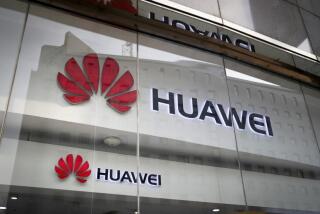FCC Gives Minorities an Edge in Wireless Auction : Communications: Agency rules will also aid women and small businesses in radio spectrum bidding war.
In an ambitious effort to assure women, minorities and small businesses an ownership stake in the burgeoning wireless communications industry, the Federal Communications Commission adopted rules Wednesday that will give those groups special treatment in a multibillion-dollar radio spectrum sale later this year.
The FCC will auction off coveted radio frequencies to be used for so-called personal communications services, which will provide a low-cost alternative to todayâs cellular telephone and paging systems.
An estimated 100 million Americans are expected to use various types of wireless communications within 10 years as competition and new technology drive prices down. The new PCS services alone are expected to generate as much as $50 billion in annual revenues and 100,000 new jobs.
Responding to fears that the FCCâs new auction system would lock out all but the most powerful big businesses--and eager to assure the disadvantaged a piece of a massive new business--Congress mandated that the FCC find a way to assure women, minorities and small businesses a fair share of the PCS licenses.
The plan approved Wednesday will allow small, minority-owned firms to win a license with bids as much as 25% below others, and it provides a range of bidding incentives and special financing and payment provisions for the other targeted groups.
Nearly half the 2,071 licenses up for grabs are reserved for medium-sized firms or those owned by women or minorities--the most aggressive federal action ever to seek broad representation of ownership in an industry.
âIn the long and tragic history of inequality between the races and gender in America, today we are creating the greatest single opportunity made available to women and minorities,â FCC Chairman Reed Hundt said.
But if past FCC minority incentive schemes are any measure, the new rules will trigger bitter controversy and possibly a court challenge by companies excluded from bidding for the reserved licenses, FCC staff members acknowledged.
âThe net effect of this policy will be to slow the development of the personal communications services industry by several years,â said J. Gregory Sidak, a former FCC employee and an analyst at the American Enterprise Institute.
Sidak also argues that the special rules will reduce the money raised by the auctions, which would go to the Treasury. As a result, he says, the special rules amount to a form of income transfer, rather than communications policy.
But Hundt cast the new rules in the context of a history-making breakthrough, noting that the 19th-Century railroad land grants that ceded a tenth of the public land of America resulted in no benefit to women or minorities.
The FCC plan does not set any quotas or goals for minority or women ownership, unlike other federal government programs aimed at disadvantaged businesses. Rather, FCC general counsel William E. Kennard said the measures are designed to create fair opportunities for broad representation.
Under the FCC plan, the 2,071 licenses available nationwide will be divided into three groups or blocks. Bidding for 986 licenses, a so-called entrepreneurial block, will be open only to firms with revenue of less than $125 million and assets of less than $500 million.
White-owned firms in that category get no special help in the bidding. Small businesses with less than $40 million revenue can bid 10% below a competitor and still win the auction--a so-called bidding credit. Minority or women-owned business get a bidding credit of 15%, and a small business owned by a woman or a minority gets a 25% credit.
In addition, the FCC will defer payment for up to five years, charging interest at a rate equal to a 10-year Treasury note.
Hundt said the special incentives will not cost taxpayers anything, but critics say the program will undoubtedly reduce Treasury receipts in the auction.
The new wireless phones will operate on a segment of the microwave band formerly allocated to private communications systems. Compared to current cellular phones, the new system will produce much lighter-weight and lower-power phones that will fit into a small pocket. They are expected to one day be whittled to about the size of Dick Tracyâs wristwatch phone.
Under the FCC plan, six license holders will compete in every geographic region--compared to just two licenses per market in the cellular telephone business. Some experts expect the average cost of a wireless call--now about 40 cents per minute on cellular systems--to be cut in half.
The Congressional Budget Office has estimated that the federal auctions for licenses for wireless telephones and licenses for advanced technology pagers could generate $10 billion for the federal Treasury.
The auction for the broad-band licenses will be conducted in three phases through an electronic marketplace before the end of the year. Another auction starting next month will cover narrow-band frequency for advanced pagers.







